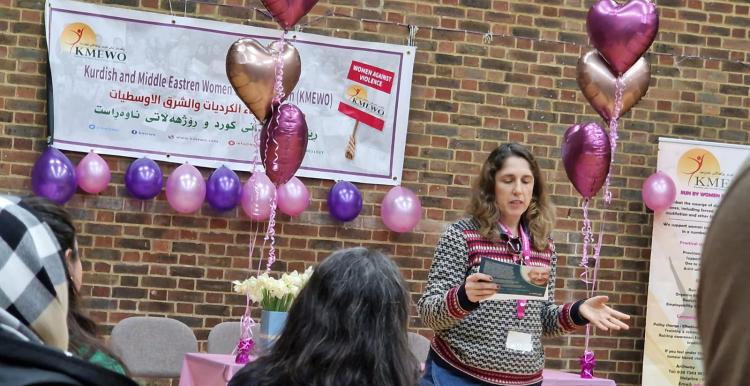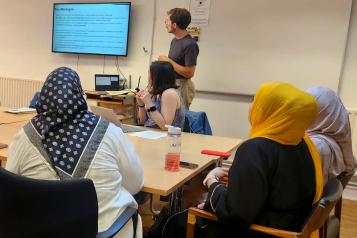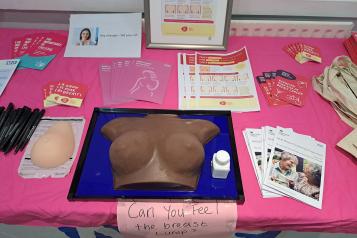Healthwatch Cancer Champion raises awareness of benefits of screening

Gulum presenting to the Kurdish and Middle Eastern Women's Organisation at Caxton House
Gulum Sener is the Healthwatch Islington Volunteer Manager. She is also a fully trained Cancer Champion. Since 2023, she has been involved in cancer awareness workshops and events to raise awareness about cancer types, signs and symptoms, and screening programmes. Gulum is originally from a Turkish background. Her work has targeted communities with less access to reliable health information due to language and cultural barriers.
Gulum has designed and delivered a series of Women’s Health and Wellbeing Workshops to engage women from different communities. She also promoted these workshops by designing posters, creating and sharing social media content, and contributing to the production and translation of cancer awareness resources.
Over the last two years, Gulum has had the opportunity to listen to residents’ experiences with cancer and broader health and social care issues. Here she summarises the key things she's learned:
1. Language Matters
“Delivering workshops with interpreters is very important for engaging residents whose first language isn’t English. Women share more experiences and ask more questions when the session is delivered in their mother tongue” explained Gulum.
Bangladeshi, Turkish, and Greek Cypriot women were highly engaged and expressed strong awareness of cervical screening. Women at similar events, without interpreting support, were less willing to speak.
2. Fear of pain puts women off screening
The most common barrier to screening uptake is fear of pain, particularly regarding cervical screening and mammograms. Women worry about breast compression, pain, or that a lump might rupture during a mammogram. Others fear the radiation exposure. The HPV vaccine also prompted many questions, especially about why boys are now also vaccinated. A common reason for avoiding cervical screening is the belief that it's unnecessary for women who are not sexually active.
3. Many women are unfamiliar with breast self-examination
Colleagues from the Royal Free Hospital attend many of the workshops Gulum organises. They use breast models to demonstrate how to check for lumps, along with visuals showing the signs of breast cancer. They also provide a step-by-step demonstration on how to perform a breast self-examination. Many women are unaware of the importance of self-exams and don’t know that they should check their breasts regularly, ideally every month. Our workshops helped to inform participants, and some even mentioned that they had started doing self-exams and, in some cases, discovered a lump.
4. Many women delay action and wait to be invited for screening
Some women wrongly assume they will always be contacted by their GP for screening. It’s important to know what your breasts usually look and feel like, so you know what is normal for you. This makes it easier to notice any changes to your breasts. One workshop participant said she would now contact her GP because of a discharge from her breast.
5. There are many questions about screening eligibility for women over 70 and those with a family history of cancer.
These topics spark interest and lively discussions.
6. Feedback from residents on access to cancer care is mixed.
Some women said their symptoms were misdiagnosed or not taken seriously by GPs. Access to GPs remains an issue in Islington. However, some women reported positive experiences, especially with breast cancer services. Women who found lumps and visited their GP were often referred quickly for a mammogram. After the workshops, Gulum has helped some women book GP appointments. And after breast cancer workshops specifically, many women take contact cards from the Royal Free Hospital nurse for follow-up.
7. Women need time to take in what they have learned about screening
Some women book screening appointments immediately after the workshops, but many more say they need more time, need to reflect on what they have heard. Most participants will need to hear these messages many times. Cancer screening can be a very emotional topic and many of the barriers to participation are profound. But change can happen over time.
"Over the last ten years, women in Bangladeshi community have become more open to discussing cervical and breast cancer and are no longer ashamed to attend screenings."
- Islington Bangladesh Association


